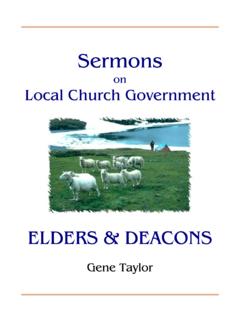Transcription of Investigating the Word of God Titus - Gene Taylor, …
1 Investigating the Word of GodTitusThe Island of CreteGene taylor gene taylor , 2006. All Rights the Word of God: Titus gene taylor -1-An Introduction to TitusTitus, the ManTitus was a full Greek since all his family were Greeks. When the question arose as to whether ornot Gentiles who were being converted needed to be circumcised, Paul and Barnabas took him toJerusalem as evidence that circumcision was not needed (Acts 15:1-5). Paul used him again asevidence to the churches of Galatia that circumcision was unnecessary (Gal. 2:1-3). Titus had evidently been converted by Paul, perhaps at Antioch of Syria, since Paul called him atrue son in our common faith (1:4).
2 He had been a fellow-worker with Paul for 15 years or moreat the time this epistle is written. Evidently he accompanied Paul on his third preaching he is not mentioned by name in the book of Acts, he may have been included in the us of Acts 20:5. He acted as Paul s messenger to the church at Corinth (2 Cor. 7:1-16). He wentamong the churches of the Gentiles, probably because he was a Gentile, to stir them up to make acontribution to the relief of the poor among the saints in Jerusalem (2 Cor. 8:6, 16-24). Evidently Titus was not as closely associated with Paul as was Timothy, but apparently he was amore stable personality and a strong man.
3 Nothing is said of his physical condition, as was thecase when writing to Timothy. Possibly he was the better of the two when it came to handlingdifficult matters. Note that Paul sent him to Corinth to handle difficult matters there and gavehim a tough assignment in Crete. He may have been Paul s best trouble-shooter among his co-workers (William S. Deal, Baker s Pictorial Introduction to the Bible, p. 385).It is not known whether he was with Paul during his imprisonment in Caesarea or his first Romanimprisonment. He did travel with Paul during some of the months of Paul s release between hisfirst and second imprisonments in Rome.
4 Paul later took him to Crete and left him there to workwith the churches he had established on that island (1:5). Later, Paul wanted him to rejoin him atNicopolis, in western Greece (3:12).The last mention of Titus in Scripture was when Paul stated, in his last epistle, that Titus had leftRome for Dalmatia (2 Tim. 4:10). Tradition states that, in his senior years, he worked among thechurches on Crete and that he died naturally on that the Word of God: Titus gene taylor -2-The Church on CreteCrete was a large island in the Mediterranean Sea located southeast of Greece. It is about 150miles long and varies from 6 to 35 miles wide.
5 Since it was very mountainous, its peopledepended on the sea for their living. During the first century, it was very prosperous. It hadupwards of 100 cities on it. Its people were known as liars, evil beasts, lazy gluttons (1:12).They were also depicted that way by Epimenides, one of their own poets. Many of the classicalwriters wrote of the Cretans that way. The expression, to act the Cretan, became an idiommeaning to play the liar. On the day of Pentecost, Cretans who were in Jerusalem to worship heard Peter s sermon (Acts2:11). If some were converted, they may have carried the gospel back to the island with them.
6 During his voyage to Rome, Paul had briefly stopped at Crete (Acts 27:7-21). When he wasreleased from his first imprisonment in Rome, Paul probably journeyed to Crete and preached thegospel there. When Paul sailed from Crete, he left Titus behind to set in order the things that arewanting (1:5).Merrill Tenney said, The situation in Crete was discouraging. The church was unorganized, andits members were quite careless in behavior. If the injunctions in chapter 2 are any indication ofwhat the churches needed, the men were lax and careless, the older women were gossips andwinebibbers, and the young women were idle and flirtatious (New Testament Survey, p.)
7 336).Roy Cogdill adds, The situation of the church in Crete was discouraging. The government of thechurch needed to be set in order, the careless behavior of its members needed to be corrected, andthe church needed to be grounded in sound doctrine and stirred to diligence in good works. Some of these needs arose in the dispositions of the Cretans (1:12-13). In addition to this, theJudaizing group that had followed Paul around disturbing the churches had some influence(1:14) (The New Testament Book-by-Book, p. 112).The Author of the Book Paul s authorship of this epistle is unquestioned by the best of authorities.
8 He asserts this in theopening words (1:1), and the general tenor of the writing is quite Pauline throughout (Deal, p. 385). The case for Pauline authorship of these epistles (1 & 2 Timothy and Titus - GT) is substantial (Nelson s Complete Book of Bible Maps & Charts, p. 434).The Date of the Book The letter was probably written shortly after First Timothy ( 62), from Macedonia,Nicopolis, or Ephesus (Robert G. Gromacki, New Testament Survey, p. 310). It appears the book of Titus was written c. 63, shortly after Paul s release from the Romanimprisonment described in Acts 28 and shortly after the composition of I Timothy (Nelson s, ).
9 Why This Book Was Written The main purpose of this epistle seems to be to give advice, counsel, final instruction, andadmonition to Titus , both as a personal son in Christ and as a Gospel (Deal, p. 384). Investigating the Word of God: Titus gene taylor -3- This brief letter focuses on Titus s role and responsibility in the organization and supervision ofthe churches on the island of Crete (Nelson s, p. 434). Generally, the book was written to urge Titus to finish the organization of the work begun byPaul (1:5). Specifically, the apostle wrote to list the qualifications of the elders whom Titus wasto ordain (1:5-9), to warn against the perverting influence of the Jewish legalists (1:10-16), togive instructions concerning proper Christian domestic behavior (2: 1-10), to demonstrate that acorrect knowledge of the doctrine of the grace of God should issue in good works rather thanlooseness of living (2:11-15), to give guidelines for proper relationships to the unsaved,especially the civil rulers (3:1-8), to point out the right order in church discipline (3:9-11), toinform Titus of Paul s future plans for his associate (3.)
10 12-13), and to send greetings (3:14-15) (Gromacki, p. 310).The Themes of the Book The general theme of Paul s letter to Titus could well be described as things which befit thesound doctrine (2:1) (Cogdill, , p. 113).One of the book s themes is the responsibilities of Titus as a gospel preacher. He was in order the things lacking by ordaining elders in every city (1:5). the things which become sound doctrine (2:1). himself as a pattern of good works (2:7-8). , exhort and rebuke with all authority in such a way that no one would despise him(2:15). his listeners to be subject to authorities, to be ready to do every good work, to notspeak evil of anyone, to not be brawlers but to be gentle and show meekness toward all(3:1-3).









